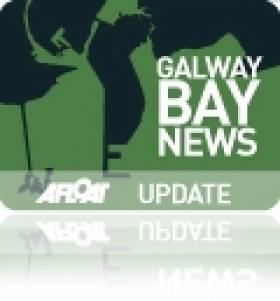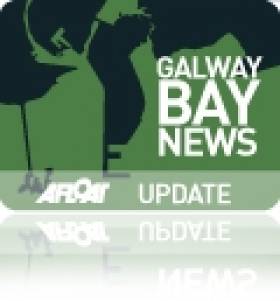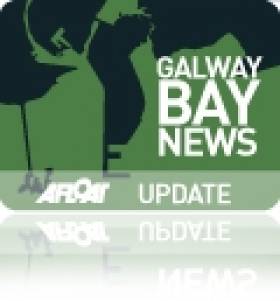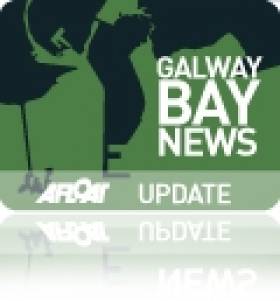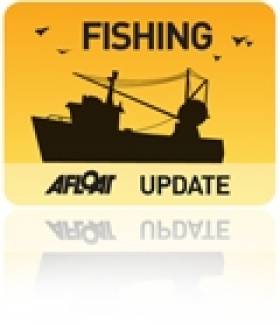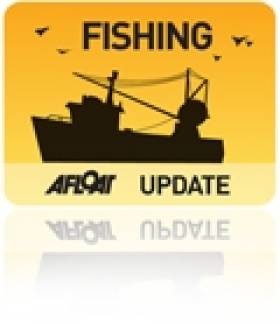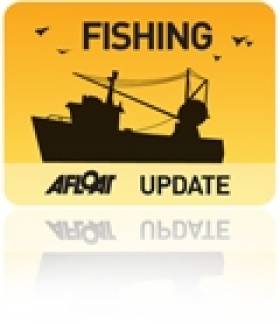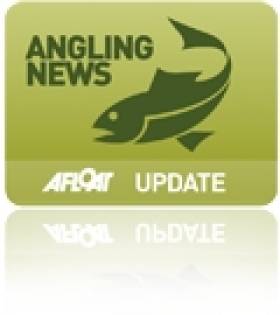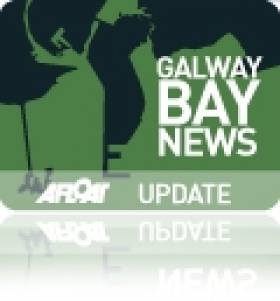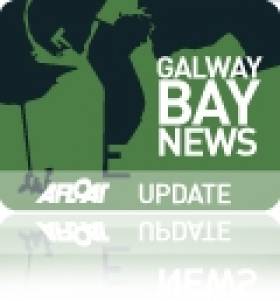Displaying items by tag: fish farm
TDs At Odds Over Galway Bay Fish Farm Plans
#FishFarm - Galway Bay FM reports that two West Galway TDs are at loggerheads over the proposed deep-water organic salmon farm for Galway Bay.
Eámon Ó Cuív of Fianna Fáil says Marine Minister Simon Coveney is showing inappropriate support for the aquaculture scheme proposed by Bord Iascaigh Mhara.
In response, Fine Gael deputy Seán Kyne reiterated the minister's own Dáil statement earlier this month that procedure would be followed 'to the letter' and that he could not take sides on the matter.
According to Galway Bay FM, the application for the 500-hectare fish farm, to be located off the Aran Islands, is still under consideration.
If greenlit, the facility would be the largest of its kind in Europe and would double the State's production rate of very profitable organic salmon.
But the plans have faced opposition from Inland Fisheries Ireland and local anglers, many of whom joined a 2,000-strong protest against the project in Galway city centre on 2 March.
#FishFarm - The Government 'will follow procedure to the letter' regarding the proposed €100-million deep sea fish farm for Galway Bay.
That was the message from Marine Minister Simon Coveney in the Dáil last week, as reported by Galway Bay FM, after it emerged that more than 400 submissions on plans for the State's largest ever aquaculture scheme were made to the his department.
The Dáil discussions came just days after a public protest against the fish farm plans in Galway - and some months after the National Inland Fisheries Forum lambasted as "flawed" the consent process regarding the proposed development.
Some 2,000 people amassed in opposition to the 500-hectare organic salmon farm off the Aran Islands proposed by Bord Iascaigh Mhara (BIM), which if it gets the go-ahead would be the largest facility of its type in Europe and would double the State's production rate of organic salmon - one of Ireland's most profitable export foodstuffs.
BIM has previously accused environmental campaigners of being "deliberately alarmist" about the fish farm, despite concerns raised my Inland Fisheries Ireland over the potential impact of sea lice infestations on wild salmon in the bay.
Meanwhile, in a letter to the Galway Advertiser last week, Attymon resident Gabe Cronolly criticises a BIM leaflet informing the public of its proposals.
"The leaflet states that sea lice can only be held responsible for one per cent of salmon losses at sea, but fail to report that 39 per cent of mortalities in fish farms are attributed to sea lice," he writes.
Thousands Attend Fish Farm Protest in Galway
#FishFarm - As many as 2,000 people attended the protest in Galway against the proposed deep sea fish farm off the Aran Islands at the weekend.
As previously reported on Afloat.ie, the demonstration was organised by Galway Bay Against Salmon Cages on Saturday 2 March in opposition to the 500-hectare organic salmon farm proposed by Bord Iascaigh Mhara (BIM).
Among the speakers on the day, as The Irish Times reports, was Icelandic salmon conservationist Orri Vigfusson, who claimed the fish farm could interfere with the migration of salmon smolts from both Ireland and the rest of Europe.
GBASC vice-chairman Tommy Casserly also spoke, referring to the fish farm project as "a toxic cloud containing seven million caged salmon with all those faeces and chemicals and lice, between the Atlantic and 15,000 wild salmon which come through these waters".
Later in the day a delegation attempted to hand a letter of protest to BIM staff attending the Skipper Expo in the city, but said it was refused.
If the Galway Bay fish farm project gets the go-ahead, it would be the largest aquaculture facility of its type in Europe and would double the State's production rate of organic salmon.
The Irish Times has more on the story HERE.
Protest in Galway Over Fish Farm Plans This Weekend
#Fishfarm - Galway Bay FM reports that a major protest is set to take place in Galway this weekend against the proposed deep sea fish farm off the Aran Islands.
Galway Bay Against Salmon Cages is organising the demonstration from Eyre Square on Saturday 2 March at noon in opposition to the 500-hectare organic salmon farm proposed by Bord Iascaigh Mhara (BIM).
The facility, to be located off Inis Oírr in Galway Bay, would be the largest of its kind in Europe and would double the State's production rate of organic salmon, cited by BIM as Ireland's leading organic food export.
However, the scheme has been facing strong opposition from fisheries groups and local anglers citing the potential environmental impact on wild salmon numbers and the threat to tourism in the area.
Inland Fisheries Ireland is among those bodies that have expressed concern over the fish farm plans, citing research on the effect of sea lice emanating from aquaculture facilities on the mortality rate of wild Atlantic salmon.
BIM responded to news of the protest by stating such action may be unnecessary due to the appeal mechanism available in the State's decision process.
IFI Welcomes New Research On Sea Lice and Wild Salmon
#FishFarm - Inland Fisheries Ireland has welcomed "a clear acceptance of the impact of sea lice on juvenile salmon" following a recent Marine Institute publication that identifies the effect of sea lice emanating from aquaculture facilities on wild Atlantic salmon mortality.
According to IFI, the paper published in the Journal of Fish Diseases "concurs with previously published international research" that it says establishes an incontrovertible link between fish farm developments and negative effects on local wild salmon numbers, as previously reported on Afloat.ie.
It adds that "the debate can now progress to identify the best methodologies to reduce or eliminate this impact" as well as moves on "the issue of escaped farmed salmon".
In a statement on the new paper, IFI says the research "identified that just under 40% of released juvenile salmon showed a significant difference in return rate between sea lice ‘treated’ and ‘non-treated’ groups, indicating that mortality from sea lice is significant in 40% of the releases in the study. Unfortunately, there was a significant effect from sea lice in six different bays along the west coast over the study period.
"This recent study provides further evidence that salmon will be impacted by sea lice. The location of salmon farms in relation to salmon rivers and the control of sea lice prior to and during juveniles salmon migration to their high seas feeding ground is critical if wild salmon stocks are not to be impacted.
"The development of resistance to chemical treatment of sea lice and other fish husbandry problems, such as pancreas disease and amoebic gill disease, are likely to make effective sea lice control even more difficult in future years."
IFI also highlights the Norwegian government's concerns about the impact of sea lice and escaped farm salmon on wild salmon stocks.
The statutory body for the protection and conservation for Ireland's inland fisheries reiterated its support for "the development of a sustainable aquaculture industry" to "safeguard wild salmon and sea trout stocks into the future".
It adds that recommendations on the above issues have been made in its submission to the Department of the Marine on the Environmental Impact Statement regarding the proposed deep-sea organic salmon farm in Galway Bay, a scheme that has been the subject of controversy over recent months.
Morning Ireland Reports On Galway Bay Fish Farm Debate
#FishFarm - RTÉ Radio 1's Morning Ireland reports on last night's public meeting in Galway on the proposed deep sea fish farm in Galway Bay.
As previously reported on Afloat.ie, the 500-hectare organic salmon farm proposed by Bord Iascaigh Mhara (BIM) would be located off Inis Oírr in the Aran Islands, and would be the largest of its kind in Europe, set to double the State's production rate of organic salmon.
BIM's aquaculture development manager Donal McGuire moved to reassure concerned locals that the agency was "not about to damage [its] reputation" by "doing something foolish or doing something that will cause serious environmental damage".
McGuire added that organic salmon is Ireland's leading organic food export but is in "very very short supply", and that business would be lost to producers in Scotland and Norway.
However, the scheme has faced strong opposition from fisheries groups and local anglers citing the potential environmental impact on wild salmon numbers and the threat to tourism in the area.
At last night's meeting, RTE's western correspondent Pat McGrath says just two of the more than 100 in attendance spoke in support of the fish farm plans.
Another public meeting on the proposals is scheduled for tonight in Rossaveal.
BIM is expected to hold a public tender process for the proposed salmon farm project pending approval by Marine Minister Simon Coveney.
High Levels of Sea Lice Detected at Irish Salmon Farms
#FishFarm - Two Irish fish farms were found to have consistently high levels of sea lice over the past six months, according to new figures.
Undercurrent News reports on findings by the Marine Institute which show that a farm owned by Marine Harvest Ireland at Lough Swilly and one operated by the Mannin Bay Salmon Company in Corhounagh were "found to have levels of sea lice which exceed the Marine Institute's protocol level of two pregnant female lice per fish."
Sea lice levels at the Lough Swilly site in particular climbed from an average of 4.35 per fish to a high of 71.72 in September before dropping to a still-high 44.88 last month.
A statement issued by Marine Harvest played down concerns over the new figures, noting that "treatment trigger levels are set a low level" in Ireland compared to other countries, and that it uses "tried and tested procedures" to deal with such infestations.
It added that lice numbers can rise and fall in tandem with changes in climate, as experienced in the latter months of 2012.
As reported on Afloat.ie last month, a new international study says some 39% of salmon mortalities can be attributed to the impact of sea lice - predominantly from fish farms - on wild salmon fisheries.
In a press release, Don Staniford of lobby group the Global Alliance Against Industrial Aquaculture (GAAIA) said: “The Irish Government should be controlling sea lice infestation on salmon farms not promoting even bigger feedlots such as the proposed 15,000-metric-ton farm in Galway Bay.”
Undercurrent News has more on the story HERE.
IFI Repeats Concerns Over Aran Islands Fish Farm
#Angling - Anglers on the River Feale in Kerry and Limerick have been assured by Inland Fisheries Ireland (IFI) that it supports their concerns over the proposed deep-sea fish farm in Galway Bay, as the Limerick Leader reports.
Local anglers are among those throughout the region who have rallied in opposition to plans for the Aran Islands fish farm project, over fears that it would lead to “an explosion” in parasitic sea lice which would prey on wild inland salmon from Irish rivers feeding in the North Atlantic.
IFI reiterated its statement issued last month in which its board said it does not believe "that the corpus of peer reviewed international scientific literature which recognises the negative impacts of sea lice on salmonids have been adequately dealt with" in the Environmental Impact Statement prepared by Bord Iascaigh Mhara (BIM) as part of the public consultation process.
A spokesperson for IFI told the Limerick Leader that the authority has "major concerns about the location and scale [of the farm], as well as its potential impact on sea life. [IFI] is not supporting it in its current form.”
Earlier this month the National Inland Fisheries Forum also criticised as "flawed" the consent process regarding the 15,000-tonne organic salmon farm planned off Inis Oirr, which would be the largest of its kind in Europe.
If approved, the operation could more than double Ireland's current production rate of farmed salmon.
The Limerick Leader has much more on the story HERE.
Fisheries Forum Lambasts Minister Over Galway Bay Fish Farm Decision Process
#FishFarm - The National Inland Fisheries Forum (NIFF) has criticised as "flawed" the consent process regarding the proposed deep-sea fish farm in Galway Bay which has stirred much controversy in recent weeks.
In a letter to the Department of Agriculture, Food and the Marine as part of the public consultation process, NIFF chair Derek Davis writes that the forum "considers the consent process to be flawed" as a result of "the decision making function being exercised by the Minister for Agriculture, Fisheries and Food" in a number of circumstances, including where:
- the applicant - Bord Iascaigh Mhara (BIM) - "has several appointees of the said minister at board level";
- the State fisheries board "receives funding and policy directions from the minister's department";
- public announcements made on the proposals and related concerns "indicate pre-judging of the issues";
- any appeal following the minister's decision "would be dealt with by appointees of the minister"; and where
- the "specific statutory basis" on which BIM authorises aquaculture operations "has not been adequately set out".
The letter reiterates Inland Fisheries Ireland's (IFI) criticisms of the Environmental Impact Statement (EIS) carried out on the proposed location of the 15,000-tonne organic salmon farm off the Aran Islands, stating the NIFF's believe that the document "is deficient in a number of areas" such as not adequately addressing wild salmon migration routes, and making presumptions on the potential impact of sea lice and escaped farmed salmon on adjacent fisheries.
The forum also has concerns regarding the public consultation itself, noting that requests for "specific scientific information used to underpin statements in the EIS" have not been followed through.
"The forum believes that on the basis of the information supplied, the minister is not in a position to make a positive decision on this application," writes Davis. "To do so would represent a failure to adhere to the precautionary principle" which applies "where there is uncertainty as to the existence or extent of risks".
The letter in full is available as a PDF to download HERE.
Groups To Protest Marine Minister's Office Over Galway Bay Salmon Farm
#FishFarm - A group opposed to the Galway Bay deep-sea salmon farm proposals has announced it will protest the constituency office of Marine Minister Simon Coveney this Saturday 15 December.
In a statement to the media, No Salmon Farms At Sea (NSFAS) said that it will join likeminded groups Save Bantry Bay, Save Galway Bay, FISSTA and Friends of the Irish Environment, along with other local and national organisations, in a protest march through Carrigaline, Co Cork to Minister Coveney's office in the town, where invited speakers will address the crowd to express their opposition to the fish farm.
As previously reported on Afloat.ie, the 15,000-tonne deep-sea organic salmon farm would be located on a 500-hectare site in Galway Bay off Inis Oirr in the Aran Islands, and would be one of the largest projects of its kind in Europe, projected to be worth more than €100 million annually for the economy, according to Bord Iascaigh Mhara (BIM).
But the proposals have raised the ire of local anglers and conservationists who fear the development could have a negative impact on wild salmon numbers in the area.
"Minister Coveney has been a strong supporter of the aquaculture industry and we intend to let him know that his support is misguided and will result in catastrophe not only for our stocks of wild atlantic salmon and sea trout, but also for the communities and local businesses that depend on their very existence," said NSFAS.
The statement also cited the recent international study involving experts from Inland Fisheries Ireland which concluded that 39% of all young salmon mortalities are directly attributable to sea lice in areas where salmon farming takes place.
It added: "The highly inflated number of jobs, which BIM claim will be created, will be far outweighed by the number of jobs lost in areas where no other industry exists apart from that in tourism...
We have a world class sport fishery here in Ireland and our outwardly projected clean environment is one of our greatest assets. However it is fragile and will be destroyed if the salmon farming industry is developed further.
"Anglers and conservationists will do everything in their power to prevent any further destruction to our environment and already declining wild salmon and sea trout stocks."
Meanwhile, in today's Irish Times, angling correspondent Derek Evans writes that "anglers, stakeholders, hoteliers, restaurateurs, islanders and west coast citizens are 'up in arms' and rallying in large numbers in opposition" to what he describes as "this outrageous proposal".
He also backtracked on his previous claim about the location of the deep-sea farm as "a step in the right direction", explaining that he was contacted by a man living on Inis Oirr who said the location for the new fish farm is just "one land mile" opposite the beach, posing a threat to its tourism assets.
The Irish Times has much more on the story HERE.


























